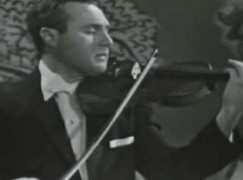Aaron Rosand: Shanghai contest looks fixed
mainThe veteran violin teacher takes a dim view of the recent Isaac Stern contest in Shanghai. Here’s what he tells Slipped Disc:
No surprises with the result of The Shanghai Isaac Stern International Violin Competition.
With the convoluted scoring system, judges were allowed to vote for their pupils giving excessively high marks, and lower grades to worthy competitors. When will competitions adopt the simple rule that can bring about an honest winner?
Teachers who accept the role of being a juror, cannot have a student in the competition. In a court of law, familiarity forbids being a juror , and the same rule should be applied in competitions to achieve fairness .
This unfair practice has become more prevalent in recent years ,where top prizes are invariably students of the jury chairman or teacher on the jury. Their tactics are hidden because many outstanding talents are eliminated in early rounds with deliberately lower scores.
After carefully examining the complex scoring in The Shanghai competition, I am wondering how this esteemed panel arrived at a decision.
From the mixed scores of the final round , I am sure they are equally as bewildered.

Independent observers have reached a similar conclusion,
It is ethically unacceptable for teachers to judge their own students. The practice must be banned.





When lesser lights make similar observation they are comfortably ignored , perhaps
the artistic stature Mr. Rosand brings to his observation may yet change this dreadful
competition practise . In this instance this competition if one is to be totally honest has
nothing to do with music or the violin as much as it has to do with politics, why people
delude themselves that it is otherwise cannot easily be explained .
This is a very old fallacy – that a teacher not serving in contests where their students take part is some guarantee of fairness. Here are just a few of the everyday situations in which a juror might not vote utterly objectively.
1. Juror taught contestant years ago, prior to the period the contest takes into account to determine a teacher/pupil relationship
2. Juror worked with contestant at summer festival, masterclass, etc.
3. Juror votes for colleague’s student in contest X, colleague votes for juror’s student in contest Y
4. Juror is a family member (even distant)
5. Juror is friends with a contestant’s family
6. Juror teaches at institution where contestant studies with someone else; aside from a situation analogous to condition 3, raising prestige of institution is still self-serving – may result in favor-trading, greater enrollment equalling pay bonuses, greater enrollment equalling bigger student pool, better student pool from which Juror may one day draw
7. Juror just likes the look of a contestant; doesn’t have to be sexual (though it might be) but could be pure simpatico, having nothing to do with the playing.
That’s off the top of my head. I’m sure more conditions can be devised.
The point you are arguing with that wall of text has nothing to do with the issue.
The issue is:
A teacher on the jury of a competition in which their student is competing is inherently unfair. And unnecessary. And stupid.
You are stating that not having the teacher there does not gurantee fairness, a separate issue that SOME competitions could strive for.
Bravo to Maestro Rosand for speaking out! Even assuming competitions have some value, which I highly doubt, what self-respecting, fair-minded person would even SERVE on a jury where, minimally, fellow jurors with students in the competition were not recusing themselves in favor of others who don’t have a dog in the fight. SHAME on David Stern & whoever else served without walking out. (If DS and others protested and I missed it, please disabuse me of my negative opinion.)
Not long ago, we all read on this site, the committee said it took them two years to prepare such event with good intention and hard work, how could Mr. Rosend make such accusation to false acclaim the competition result is fixed?
With due respect, Mr. Rosend, please make sure you don’t visit China and do not teach any Chinese students in future.
From a Chinese friend of mine!
Gina
I fail to find the logical thread in this response. But in any event, if the committee worked so hard to produce a great event, then it deserved better than a jury whose objectivity would be open to question and would bring the competition into disrepute. Nobody is impugning China here; this has been a problem all over the world in recent years, judging from the postings on Slipped Disc. Perhaps the committee could have used this new competition to create a new model for jury/participant selection and scoring.
The logic is obvious – being accused for a fixed result, Mr. Rosend insulted the whole committee. End of!
This latest ridiculous Shanghai farce disguising itself as a violin competition is what
insults the rational mind .Being in a” free” country Mr. Rosand has every right to his
personal opinion , and every right to teach whomever he wishes ,you might pass
this along to your friend.Also get the name right,as your first step in logic
Unfortunately, Mika, in this ‘free’ country, expressing one’s honest opinion may have dire personal and professional consequences.
Sorry Milka for my typo, too late to stop the post when I saw I misspelled your name. My apologies.
Music is not sport.
The entire concept of playing to beat somebody else is disgusting. “What about auditioning for a position?” you may ask. I have no answer for that.
Competitions at this level are merely a way to make money for TPTB. Bookings, tours, and on and on…
In any case, bravo Mr Rosand. Oh, and also bravo Mr Kremer.
Let’s stipulate, for the sake of argument, that a competition should only have jurors who have no previous teaching relationship with the competitors. How is this to be accomplished, in practical terms? Jurors, especially those with still active performance careers, have to be booked somewhere between a year and two years in advance, so competitors would have to be chosen even farther ahead of time than that. Choosing players in January of 2017 for a competition to take place in June of 2019 doesn’t seem like the best idea to me. Someone who might well play well enough in 2019 to come first will not necessarily stand out to that degree 2+ years earlier; someone who stands head and shoulders above the other applicants in 2017 might be ready to fade into obscurity by the time the actual contest comes along. I just don’t see how this can work in the real world.
Very easy.
There are several teachers who are known for teaching aspiring soloists and are very likely to have students entering competitions with big prizes.
Who they are is obvious.
Just don’t ask them to be judges. Very easy. Did I mention that this is very easy?
Simple. Don’t have competitions judged by teachers.
Or even better, don’t have competitions.
There are too many non-sequiturs here especially re China. I have no idea if Wai Kit Leung lives in China, but I have visited many times and have many friends there. Speaking your mind on the issue of a violin competition is not going to have “dire personal and professional consequences.” What might have some consequences would be a specific public attack within the country on the conductor who just “happens to be” the Music Director of all three main orchestra. Thereafter your chances of guest engagements might be diminished!
Milka is spot on in her first observation. Teachers at any time in a contestant’s life should not be part of any jury. It is a dreadful practice clearly open to some form of corruption. Bravo Maestro Rosand for bringing this back to the front burner! I had the pleasure of once working with you a long time ago and it was both an artistic triumph and a total joy.
Dear Nick,
I live in Hong Kong. I was actually referring to a different country when I wrote ‘free’ country – it is the country known for freedom. Somehow a certain group of musicians from there are fearful of expressing their honest opinion, even on the deceased, in fear of (rightfully) castigation from their peers.
Perhaps instead of hiding behind a smoke screen of innuendo you might
point out where these people are who live in such fear.Can they be helped ?
Can we at least let them know they are not alone living in such oppressive fear.
All art is about freedom – it is about the smallest nobody scratching away on a pad
or a fiddle for that matter to the most celebrated such as Mr. Rosand so again I
ask you who are these people who live in such fear .
Dear Milka,
Have you read the SD reports on me, from 30 June?
At your suggestion I read the whole thing … it seems but a tempest in a tea pot……
hardly worth attention in the world scheme of things , but no doubt very important to you .
The only thing one could fault you for would be your confusion as to the duties of a so
called music critic . As for the rest it is all a matter of personal opinion and not
worth a spit in the ocean . Go out there and be not afraid to shake up the oboe world.
I have wonderful friends who believe Callas & Sutherland to be great singers, go figure .
Dear Milka,
The review itself is inconsequential. Many people, most of whom I didn’t even know, messaged me privately saying they agreed with my review that the playing was poor. But all of them urged me to keep the conversation absolutely secret, because they were afraid of castigation by the circle otherwise. People on this forum at least have the courage to call Bron out.
Mr. Bron is an expert at assisting his students. In the competition, there were three participants who declared a current or former teaching relationship with Mr. Bron. In the first round, Mr. Bron scored these students 95, 95 and 98. The averages of the other ten judges’ scores for the same students were: 74.4, 80 and 91.7. Mr. Bron’s average score for students not his own was 76.6. In the second round, Mr. Bron scored his three students 272, 294 and 294. The averages of the other ten judges’ scores for the same students were 232.4, 265.2 and 273. Mr. Bron’s average score for students not his own was 242.5. In the final, Mr. Bron awarded his own students 99 and 98, while awarding no other student a score above 93 and awarding the third place winner only a 91. The other judges awarded Mr. Bron’s students an average of 94.2 and 91.2 in the finals. Mr. Kuschnir, who also had a student participate in the final, awarded his own student a score of 99, while not awarding a score above 90 to any other competitor, and awarding the winner and third place finisher scores of 88 and 90. Had Mr. Kuschnir’s score for his own student been excluded from the results, the winners of second and third place would have been switched. While it doesn’t appear that Mr. Bron’s judging was dispositive to the final results, it is hard not to look at his scoring across the competition without finding a high likelihood of bias. The main reason, his scores don’t appear to have influenced the final results, is that the arrangers of the competition had a sufficiently large jury. There are, of course, relatively simple solutions to judges scoring this way – eliminate high and low scores for each student, eliminate judges’ scores for their own students, eliminate outlying scores from each judge, avoid scores and use only pass/fail/place, etc. etc. However, this entire experience of the “most transparent and most fair competition” begs the two questions of: why do competitions invite Mr. Bron to judge? and why do competitors who are not students of Mr. Bron bother to show up?
“Hope ” springs eternal and answers both questions even with the likes of Bron and Kuschnir about . The word “hope” both Bron and Kuschnir know only too well which allows them to survive as they do.
They trade on hope.
Well, he doesn’t say this when his students won first prizes…